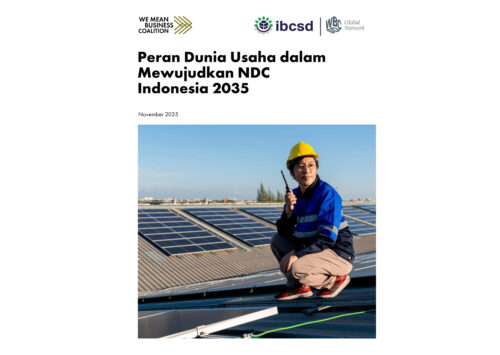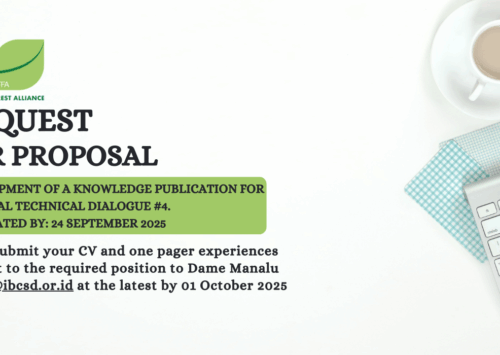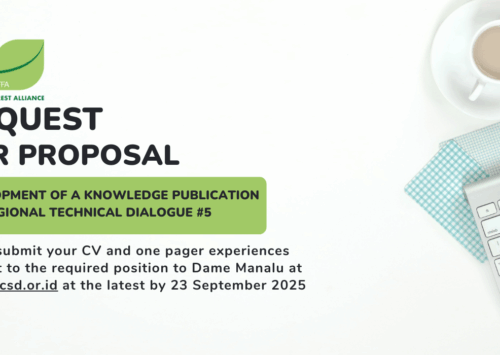The event was opened by Dharsono Hartono, the Executive Committee of IBCSD & Head of Permanent Committee on Climate Change Kadin Indonesia. “Data from the Ministry of Industry shows that in 2022, emissions from Indonesia’s industrial sector are also dominated by emissions from energy supply. It is only natural, if we as industry players and institutions that are involved in the energy supply sector are able to transition so that our energy supply is far more environmentally friendly”, said Dharsono.
The event featured esteemed and holistic speakers and panelists which represent the stakeholders loop between public and private sectors. The keynote speaker of this event was represented by the Director of Energy Conservation, Directorate General of New, Renewable Energy, and Energy Conservation, Ministry of Energy and Mineral Resources, Gigih Udi Atmo.
In his keynote speech, Gigih highlighted Indonesia’s current target and achievement on decarbonization through energy transition. Indonesia’s main goals in decarbonization in the energy sector is to achieve net zero emission from energy in 2060, with the closest target in 2030 following the issuance of Indonesia’s Enhanced Nationally Determined Contributions (E-NDC). Based on E-NDC, in 2030 the emission reduction from the energy sector is targeted at 358 million ton CO2eq by our own effort and until 2023, this target has been reached up to 35.6% or at 127.67 million ton CO2eq. The current progress is achieved through several means of energy transition approach including the development of new and renewable energy as well as applying energy conservation in various sectors. Aside from current targets and achievements, Gigih also underlines the challenges faced in energy transition, especially in the development of new and renewable energy. Several challenges that were addressed during the event include the availability of technology innovation and its mastery, economical feasibility, readiness of supporting industry, supply and demand issue, as well as readiness for project implementation especially in administrative areas including permit process and land preparation.
The theme setting in Gigih’s speech was further explored through the panel sessions, which featured several key champions in energy transition in Indonesia. They were including Head of Joint Office from Indonesia Energy Transition Taskforce (Rumah PATEN), Edo Mahendra, Head of Energy Transition Taskforce of Indonesia Chamber of Commerce and Industry (Kadin Indonesia), Anthony Utomo, Executive Director of Institute for Essential Services Reform (IESR), Fabby Tumiwa, and Head of Sustainability of Coca Cola Euro-Pacific Partners Indonesia (CCEPI), Natasha Gabriella.
The inauguration of Indonesia Energy Transition Taskforce (Satgas TEN) earlier this year marked the eagerness of Indonesia in achieving energy transition. In his presentation, Mr. Edo Mahendra shares insight regarding this initiative. Their main function as a collaborative institution consisting of various key champions from several ministries is to accelerate the development of energy transition in Indonesia, this shall include debottlenecking of various challenges faced in energy transition and facilitating business and public initiatives in enhancing energy transition in Indonesia. Two of main products that will be seen in the near future from this initiative are the development of IET (Indonesia Energy Transition) Channel and Energy Transition Hub. Both platforms were expected to have a pivotal function in accelerating Indonesia’s energy transition programs and collaborations between sectors and stakeholders.
In line with the above national initiative, Kadin Indonesia, as the biggest business association in Indonesia, has also established its own Energy Transition Task Force. To support the national strategy, Anthony Utomo said that Kadin Energy Transition Task Force has three main pillars on transition for Indonesia’s low carbon green industrial ecosystem development, comprising Green Industrial Development Initiative (GIDI), Renewable Energy Manufacturing (REM), and Distributed Energy. Their capital goal is to achieve USD 10.3 million of green industries market valuation by 2050.
The importance of energy transition and industrial decarbonization is also underlined by Fabby Tumiwa, as representative from one of non-governmental institutions being upfront in various decarbonization and energy transition initiatives. Despite the many challenges explored by his institution, Fabby emphasized that the industrial decarbonization and energy transition will also generate several benefits for the nations, including around 9-30% cost saving opportunities from energy, creation of new target market and increased product competitiveness, potential carbon tax savings with minimum of IDR 30,000/ton CO2eq, creation of up tp 3 millions green job opportunities, improved environmental quality and biodiversity, and reduced need for health subsidies.
Agreeing to the importance of energy transition to achieve national targets as well as obtain potential benefits arising from it, Coca Cola Euro-Pacific Partners Indonesia (CCEPI) as one of prominent industry players has taken a step further in achieving industrial net zero in energy. Natasha said that CCEPI has a very optimistic target to achieve 100% renewable energy across all markets by 2030 as well as achieving net zero emissions (Scope 1,2,3) by 2040. As a realization of this target, CCEPI has invested around IDR 94 billion to develop the largest single-building rooftop solar in Southeast Asia with clean solar energy generation up to 9.6 GWh powering their manufacturing plant and reducing emission up to 8000 tons CO2eq annually.
It was clear that beyond the very optimistic targets and various barriers that need a collaborative debottlenecking process, Indonesia is in the right direction to advance its energy transition strategy, achieving net zero emissions from the energy sector in 2060.
As an association that promotes sustainable development, IBCSD is strongly committed to supporting that spirit and expand further through our Integrated Energy Transition Strategy program.








